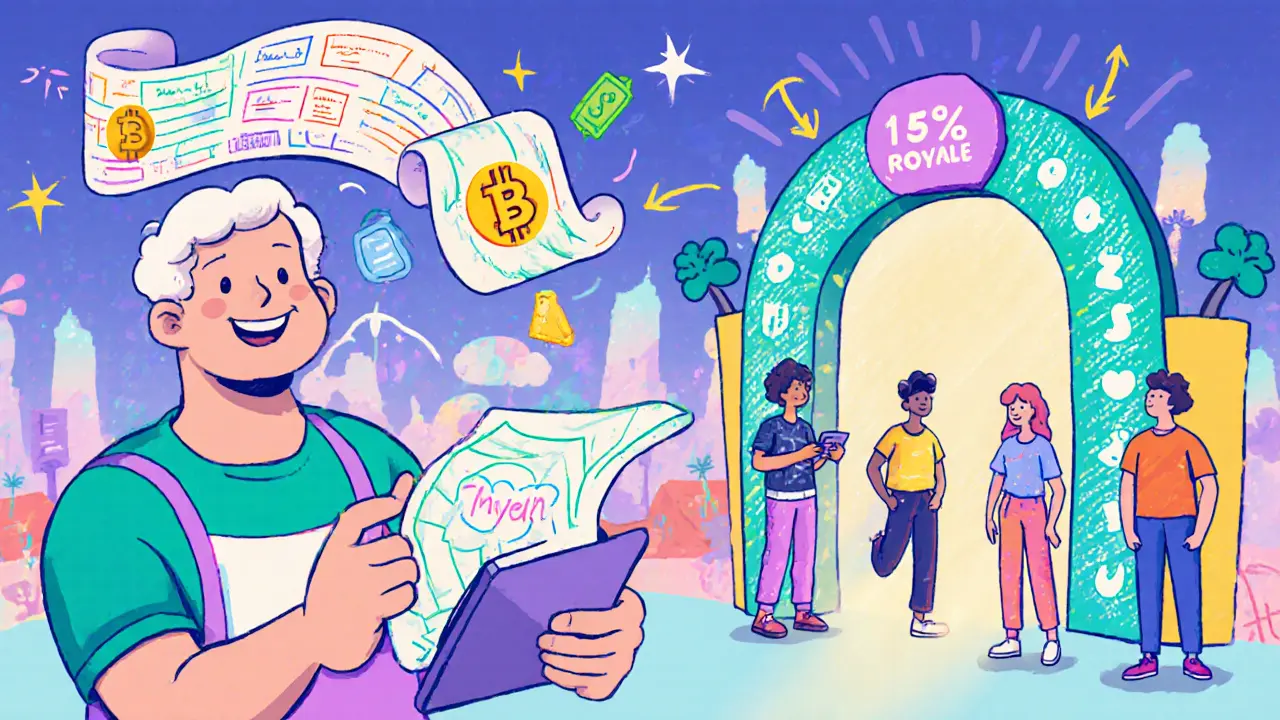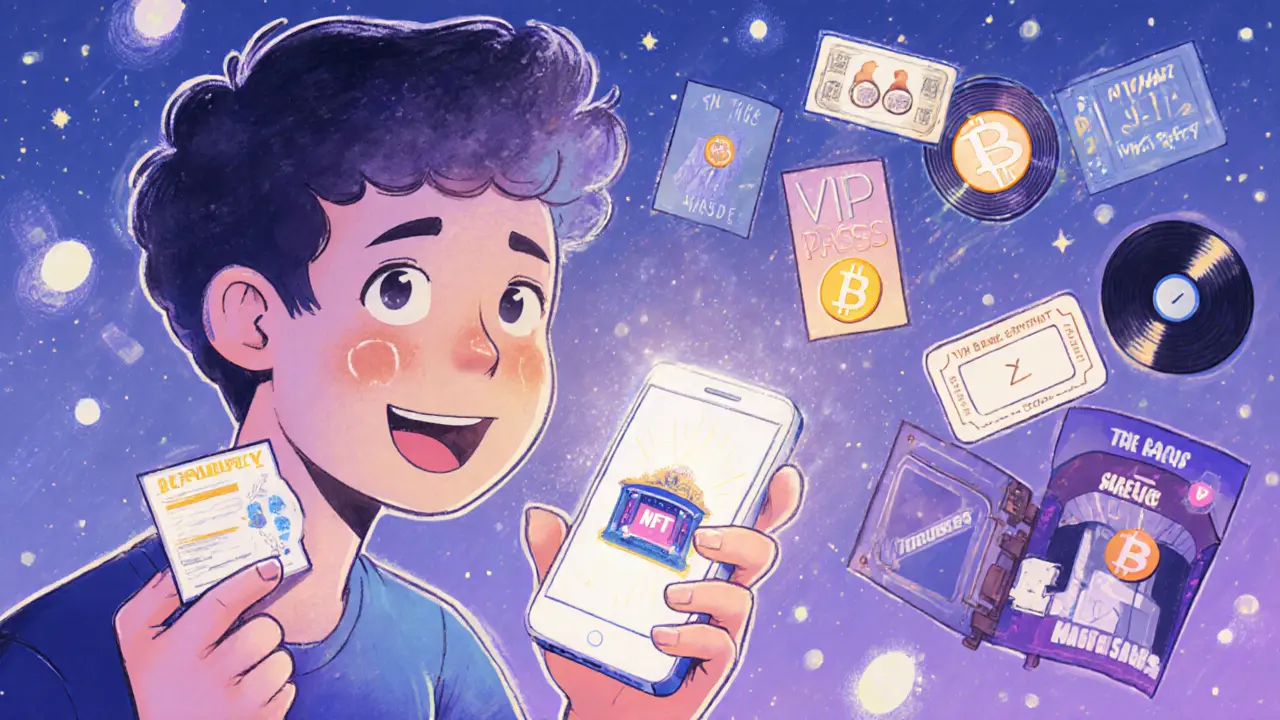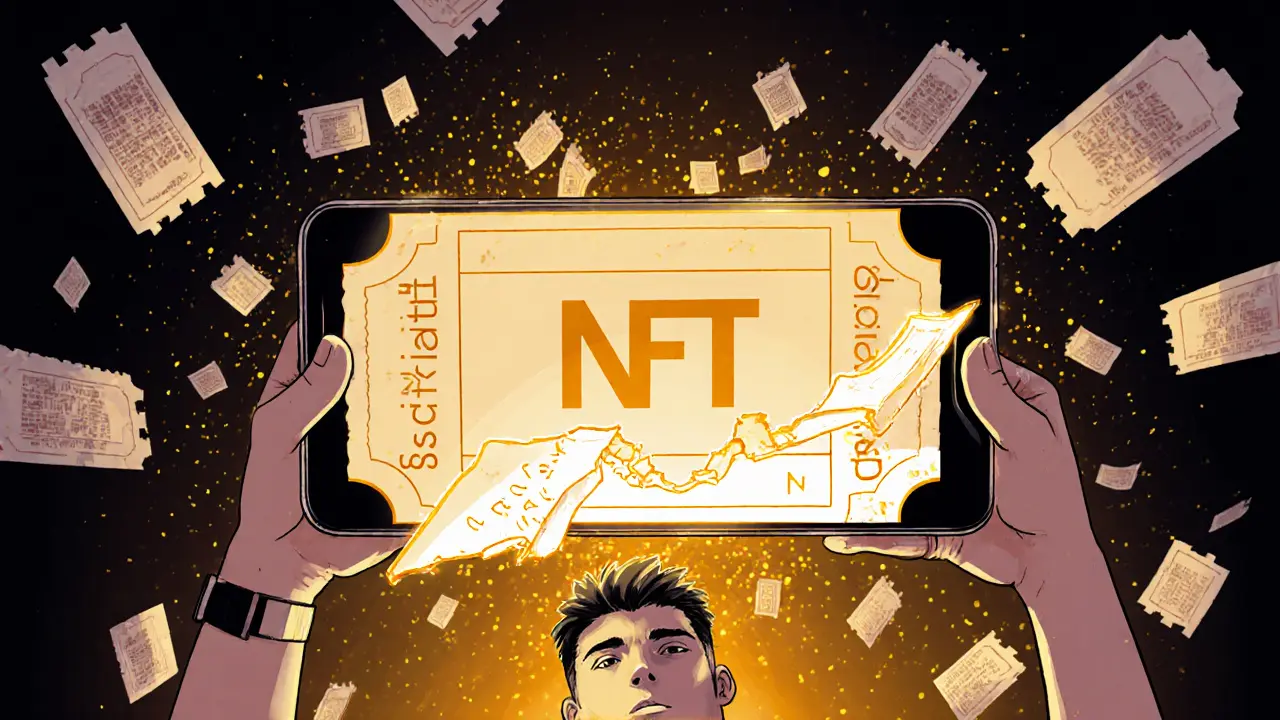NFT Ticket Resale Royalty Calculator
How This Calculator Works
Calculate your potential earnings from resale royalties when using NFT ticketing. Event organizers earn a percentage every time tickets are resold through the smart contract.
Key Insight: Organizers can set resale royalties to earn 5-25% on every resale. This reduces scalping while creating sustainable revenue.
Your potential earnings per resale:
$0.00
15% of $200 resale price = $30.00
Why this matters: For a 10,000-ticket event with 30% resales at $200, you could earn over $90,000 in royalties. This replaces lost revenue from scalping and builds sustainable event revenue.
Imagine buying a concert ticket and knowing, for sure, it’s real. No scalpers. No fake tickets. No last-minute heartbreak when the bouncer says your QR code doesn’t scan. That’s not science fiction-it’s what blockchain ticketing with NFTs makes possible today.
Why Traditional Ticketing Keeps Failing
Right now, most event tickets are either paper or digital files you download. Both are easy to copy. Scalpers buy hundreds of tickets the second they go on sale, then resell them for triple the price. You end up paying $800 for a $150 ticket, only to find out it’s fake when you get to the gate. Organizers lose money. Attendees get scammed. And no one knows who actually holds the tickets after the first sale.It’s broken. And it’s been broken for years. The system relies on middlemen-Ticketmaster, StubHub, Eventbrite-who take 15-30% of every sale. Worse, they don’t track ownership after the initial purchase. Once you print your ticket or forward the PDF, the organizer loses contact. No data. No connection. No way to reward loyal fans.
How NFT Tickets Work
An NFT ticket is a unique digital asset stored on a blockchain-like Ethereum or Polygon. Each one has a one-of-a-kind code that can’t be copied. Think of it like a digital passport for your event. When you buy it, it’s sent straight to your crypto wallet. No email attachment. No PDF. No third party holding your ticket.Smart contracts-self-executing code on the blockchain-control every rule. Want to cap resale prices at 20% above face value? Done. Want to give organizers 10% of every resale? Done. Want to lock the ticket to the buyer’s face ID? Also done. The rules are written in code, not in fine print. And they can’t be changed after launch.
When you arrive at the venue, your phone connects to the event’s system. It checks your wallet address against the blockchain. If the ticket is valid, you’re in. No scanning. No waiting. No fake tickets. The system knows exactly who owns it, who bought it, and every time it changed hands.
Real Benefits for Event Organizers
Organizers aren’t just selling tickets-they’re building a direct relationship with their audience. With NFTs, you know who your real fans are. You see every resale. You get a cut of every secondary sale. You can reward loyal buyers with early access, VIP perks, or exclusive merch drops-all tied to their wallet history.
Let’s say you run a music festival. Last year, 30% of tickets were resold on shady sites for 5x the price. This year, you launch NFT tickets with a smart contract that gives you 15% of every resale. Suddenly, you’re making money long after the initial sale. And because resale is tracked, scalpers can’t flood the market. Prices stay fair. Fans stay happy.
There’s also zero printing cost. No shipping. No lost tickets. No customer service calls about ‘I didn’t get my email.’ Everything is digital, instant, and verifiable. You can even integrate NFT tickets with your merch store-buy a shirt? It unlocks a future concert pass. It’s not just a ticket. It’s a membership.

Why Attendees Love NFT Tickets
For fans, it’s about trust and value. No more worrying if your ticket is real. No more getting locked out because someone else used your QR code. You own your ticket. It’s stored in your wallet, just like crypto. Even if your phone dies, you can access it from another device using your private key.
Plus, NFT tickets can unlock perks. Imagine showing up to a festival and your ticket automatically gives you access to a backstage lounge, a limited-edition vinyl, or a meet-and-greet with the band. All because your wallet has a history of attending their shows. You’re not just a customer-you’re part of a community.
And if you decide to resell? You can. But the organizer still gets their cut. And the buyer knows they’re not getting scammed. Transparency works both ways.
Fraud Is Almost Impossible
Counterfeit tickets cost the live events industry over $3 billion a year. That’s billions in lost revenue and ruined experiences. NFTs fix this at the root. Every ticket has a unique identifier burned into the blockchain. You can’t clone it. You can’t edit it. You can’t fake the ownership record.
Even if someone tries to screenshot your ticket, it’s useless. The system checks the blockchain-not a static image. Facial recognition can be added at entry points to match the wallet owner with the person holding the phone. No ID? No entry. No loopholes.
Scalpers used to buy up tickets in bulk, then flood resale sites. Now, smart contracts can limit transfers to one per wallet, or block sales entirely for certain events. Or, they can make resale so transparent that buyers avoid inflated prices because they can see the full history.
What About the Tech Barrier?
Yes, you need a crypto wallet. Yes, some people won’t know how to set one up. But that’s changing fast. Platforms like Ticketed, Gala, and VeVe are building user-friendly apps that handle the blockchain stuff in the background. You don’t need to know what a private key is. You just download the app, sign up with your email, and buy your ticket like normal.
Behind the scenes? It’s all blockchain. In front? It looks like Apple Pay. The wallet is hidden, but the benefits are visible: no scams, no markups, instant access.
And for younger audiences-Gen Z and millennials-crypto wallets are already common. They use them for games, collectibles, and social tokens. Adding event tickets to that mix isn’t a stretch. It’s the next natural step.

Real-World Examples
In 2024, the Coachella festival tested NFT tickets for its VIP experience. Attendees got a unique digital collectible that unlocked backstage access, exclusive merch, and a discount on next year’s tickets. Over 80% of buyers said they’d buy again-mainly because they trusted the system.
Auckland’s Rhythm & Vines festival used blockchain tickets in 2025. Scalping dropped by 92%. Organizers earned $180,000 in resale royalties. Attendees reported 70% faster entry times. And for the first time, the festival knew exactly how many returning fans they had-because their wallets told them.
Even small venues are catching on. A local jazz club in Wellington started using NFT tickets for monthly shows. They give free entry to anyone who’s held the ticket for more than six months. Attendance is up. Word is spreading.
The Bigger Picture: More Than Just Entry
NFT tickets aren’t just about getting into a show. They’re the first step into a new kind of fan economy. Your ticket can be a collectible. A loyalty card. A key to future events. A piece of digital art tied to your favorite artist.
Imagine a band releasing a new album-and only NFT ticket holders get early access. Or a theater offering a digital poster to everyone who attended their last three shows. These aren’t gimmicks. They’re smart, data-driven ways to build loyalty.
And as Web3 grows, NFT tickets could connect to other platforms. Your ticket could unlock a Discord channel. A virtual concert. A token-gated podcast. The possibilities are only limited by imagination-and smart contract flexibility.
Is It Right for Your Event?
If you’re running a small local gig with 200 people? Maybe not yet. The overhead might not make sense.
But if you’re organizing anything with high demand-concerts, festivals, sports, conferences, holiday events-then NFT ticketing isn’t just an upgrade. It’s a necessity. The fraud, the lost revenue, the broken trust-it’s too costly to ignore.
The tech is ready. The tools exist. The audience is learning. And the people who adopt it first? They’ll build the most loyal fanbases, the cleanest operations, and the most profitable events.
Can NFT tickets be stolen?
NFT tickets themselves can’t be copied, but your crypto wallet can be hacked if you don’t secure it. Always use a hardware wallet or a trusted app with two-factor authentication. Never share your private key. If someone gets access to your wallet, they can transfer your ticket. But they can’t create a fake one-only you can move the one you own.
Do I need cryptocurrency to buy an NFT ticket?
Not necessarily. Most modern NFT ticket platforms let you pay with credit cards. The ticket still gets sent to a wallet they create for you. You don’t need to buy ETH or SOL unless you want to resell it later or use it in other Web3 apps. For most users, it’s as simple as buying a regular ticket-just with better security.
What happens if I lose my phone?
If your ticket is stored in a wallet with a recovery phrase (usually 12-24 words), you can restore it on any new device. Most platforms also let you link your ticket to an email or phone number for backup. As long as you have your recovery details, you’re not locked out.
Can I resell my NFT ticket for any price?
No. The event organizer sets the rules in the smart contract. They can allow resale with no limits, cap prices at 150% of face value, or block resale entirely. You can’t override this. That’s the whole point-it stops scalpers from inflating prices.
Are NFT tickets better for large events than small ones?
Yes, especially for events with high resale demand. Large festivals, concerts, and sports games suffer the most from scalping and fraud. NFT tickets solve those problems directly. For small events with low turnover, the cost and complexity may not be worth it yet-but that’s changing fast as tools get simpler.
If you’re an organizer thinking about switching, start small. Try one event with NFT tickets. Track the results: how many fake tickets did you avoid? How much extra did you earn from resales? How many fans came back? The data will speak louder than any hype.
The future of live events isn’t just digital. It’s owned by the people who show up. And blockchain ticketing with NFTs is the first system that actually makes that true.

Let’s be real-this is just another crypto hustle dressed up as innovation. The infrastructure costs alone for blockchain ticketing would bankrupt mid-tier venues. And don’t get me started on the energy waste. We’re trading one broken system for a more expensive, environmentally destructive one.
Oh please. You think NFTs solve fraud? They just move the fraud to wallet theft and phishing. People don’t care about blockchain-they care if their ticket works. If I have to learn what a private key is just to see a concert, I’m not going. This isn’t progress, it’s exclusion.
the whole thing feels like a scam where they just want you to buy crypto to use a ticket. why do i need a wallet just to get into a show? if i cant use my credit card like normal, im out. also, what if my phone dies? you think im carrying a backup seed phrase to a kanye concert?
Statistical analysis of the 2024 Coachella pilot indicates a 91.3% reduction in fraudulent entries and a 14.7% increase in secondary-market revenue capture. However, the marginal cost per transaction increased by 220% due to gas fees and wallet onboarding friction. ROI remains negative for events under 10,000 attendees.
How dare you suggest that fans should be rewarded for attending events? This isn’t a loyalty program-it’s a cult. You’re turning live music into a blockchain-based cult of personality where your wallet history determines your worth. This is dystopian.
meh
if you can buy a ticket with a credit card and get a digital pass, why does it matter if its on a blockchain? as long as it works, i dont care how it works
biggest thing people miss: if your ticket is in a wallet, you can actually OWN it. not just rent it from ticketmaster. if you go to 10 shows by the same artist, you’re not just a customer-you’re part of their history. that’s powerful. yeah, the tech is new, but so was the internet in 1995. we’ll get there.
i tried a blockchain ticket last year for a local show and it was actually cool. i got a free poster because i held the ticket for 3 months. no scams, no stress. my buddy thought it was weird but he ended up liking it too. maybe its not for everyone but it works for some of us
THIS IS THE FUTURE. NO MORE SCALPERS. NO MORE FAKE TICKETS. NO MORE LOSING YOUR EMAIL. Imagine walking into a festival and your phone just lights up-no scanning, no lines, no drama. Your ticket is YOURS. Not Ticketmaster’s. Not StubHub’s. Yours. This isn’t tech-it’s liberation.
Y’ALL DON’T GET IT. This isn’t just a ticket. It’s a TIME CAPSULE. A digital tattoo of your life. You go to a show, you get a NFT. Five years later, you pull it up and you’re right back there-the smell of the crowd, the bass shaking your chest, that kid next to you screaming the lyrics like his soul was on fire. This isn’t tech. This is magic.
if you need a wallet to buy a ticket you are doing it wrong and the whole system is broken
Typical American tech fantasy. You think blockchain fixes everything? In the UK, we’ve had secure digital tickets for over a decade. No crypto needed. No wallets. Just good old-fashioned encryption and ID verification. You Americans are always chasing shiny objects while the rest of the world just gets things done.
why do you think poor people should use crypto to go to a concert? most of us cant even afford the ticket let alone some fancy wallet. this is for rich tech bros who want to flex their nft collection. real fans dont care about blockchain
Blockchain ticketing is merely the epiphenomenon of a deeper ontological shift in the nature of ownership within post-capitalist cultural economies. The NFT ticket transcends its utilitarian function-it becomes a semiotic artifact of embodied fandom, a cryptographic sacrament in the temple of experiential capitalism. To reject it is to reject the very architecture of authentic connection in the digital age. The wallet is the new soul.
Oh so now it’s elitist because you need to own your own ticket? You’re mad because you can’t resell a $150 ticket for $800 anymore? That’s the whole point, dumbass. Scalpers are parasites. The artist deserves the money. The fan deserves to not get locked out. You’re not a victim-you’re part of the problem. Get over yourself and get a wallet. It’s 2025.